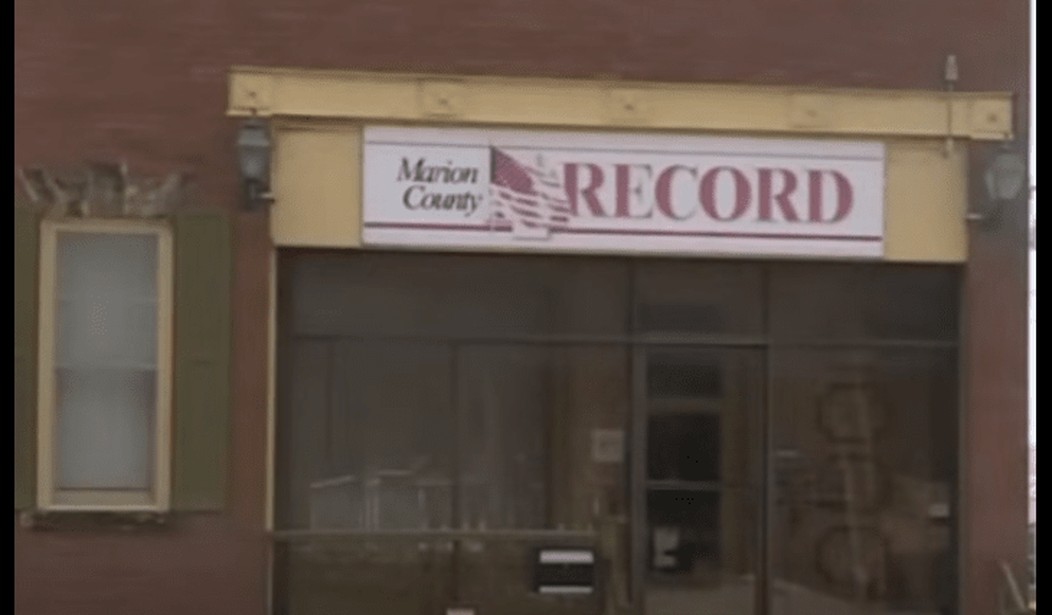In a bizarre and alarming incident, local law enforcement in a Kansas town raided a newspaper, seizing computers, cell phones, and reporting materials. It is believed that the police department’s actions were the result of a response to the media outlet’s publishing of articles portraying a restaurant owner in a negative light.
This is a rather strange case based on the details that are currently available. But the most obvious concern in this tale is the potential violation of the First Amendment protections of freedom of the press. Here’s what happened:
In an unprecedented raid Friday, local law enforcement seized computers, cellphones and reporting materials from the Marion County Record office, the newspaper’s reporters, and the publisher’s home.
Eric Meyer, owner and publisher of the newspaper, said police were motivated by a confidential source who leaked sensitive documents to the newspaper, and the message was clear: “Mind your own business or we’re going to step on you.”
The city’s entire five-officer police force and two sheriff’s deputies took “everything we have,” Meyer said, and it wasn’t clear how the newspaper staff would take the weekly publication to press Tuesday night.
The raid followed news stories about a restaurant owner who kicked reporters out of a meeting last week with U.S. Rep. Jake LaTurner, and revelations about the restaurant owner’s lack of a driver’s license and conviction for drunken driving.
The situation began earlier in August when Meyer was kicked out of a local coffee shop. The establishment was hosting a United States congressman for an event and the owner was concerned about how the journalist might cover the proceedings:
Earlier this month, Meyer said he was at Kari’s Kitchen, a coffee shop Newell operates, for a public meeting event with US Representative Jake LaTurner, a Republican who represents the area. While it was a public meet-and-greet event, Meyer said he and his reporter, Phyllis Zorn, were asked to leave.
“I was standing in line waiting to get a drink at the coffee shop where we were and the police chief came up to us and said you’ve been asked to leave by the coffee shop owner,” Meyer said. “She said we don’t want the media in here, so they threw us out.”
…
Meyer said Zorn then received a tip about Newell allegedly driving without a valid driver’s license after a traffic offense in 2008.
Newell confirmed to CNN that she had asked Meyer and his reporter to leave during the public meet-and-greet event with Rep. LaTurner because she believes the newspaper “has a long-standing reputation for twisting and contorting comments within our community.”
“When they came into the establishment, I quietly and politely asked them to exit,” Newell said. “I didn’t feel that their constituents needed to be exposed to any risk of being misquoted.”
Newell claimed that the Marion County Record illegally obtained information about her that was only available to law enforcement and insurance agencies. “Not only did they have information that was illegal for them to obtain in the manner in which they did, but they sent it out as well,” she told reporters.
The news outlet later published an article exposing these personal details about Newell, who claims it did so “strictly out of malice and retribution for me asking him to exit my establishment.”
Still, concerns remain about this incident from a First Amendment perspective. Meyer referred to the police’s actions as “an atomic flyswatter” and explained that because of the seizures, the newspaper doesn’t “have any of our logs of advertising, the ads that were prepared, and things that were ordered.” Because of these circumstances, he was not able to publish the paper on time.
“As far as I can see, the entirety of law enforcement in Marion County was involved in this,” Meyer explained, noting that all four employees of the department were present at the search.
There is quite a bit to unpack here.
From a freedom of the press perspective, this action on the part of local law enforcement raises some critical implications regarding Constitutional protections for media. It is possible that the warrant used to justify the raid could violate federal laws protecting the ability to gather and distribute information. This raid could easily have a chilling effect on journalists in the state if it is allowed to stand.
Critics like Emily Bradbury, executive director of the Kansas Press Association, blasted the raid as an “assault on the very foundation of democracy and the public’s right to know.”
Unless there are some extremely extreme extenuating circumstances in this affair, Bradbury is probably right. So far, there does not seem to be any detail that would justify a full-on raid on the offices and homes of journalists, even if they managed to obtain information from sources that were not supposed to be leaking them. Needless to say, this is not an action any law enforcement should be taking against the press. Not for something this flimsy.
This story raises valid concerns about the ability of the press to do their work without fear of retribution from the government. Additionally, it also highlights why it was so important to have Constitutional protections for journalists in the first place.













Join the conversation as a VIP Member